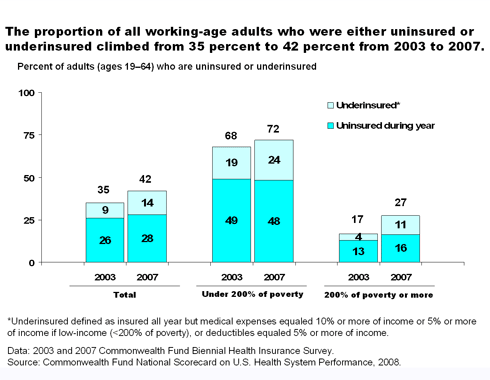In its first national scorecard released two years ago, The Commonwealth Fund's Commission on a High Performance Health System found that the United States fell far short of benchmarks for access, quality, efficiency, and other key measures of health system performance. The 2008 edition of the scorecard, released on July 17, paints an even bleaker picture.
As detailed in the report, Why Not The Best? Results from the National Scorecard on U.S. Health System Performance, 2008, the U.S. scored an average of 65 out of a possible 100 across 37 indicators of health outcomes, quality, access, efficiency, and equity—slightly below the overall score in the 2006 report. The scores compare average performance in the U.S. with performance achieved by the top states, health plans, health care providers, or countries.

Most troubling, the report finds, is that the health system is actually backsliding on measures of access to care and affordability. For example, as of 2007, 42 percent of all working-age adults were either uninsured or underinsured, up from 35 percent since 2003. And the U.S. continues to fall far short on key indicators of health outcomes and quality, with particularly low scores on efficiency.
"The scorecard tells us that we are losing ground in crucial areas like access to health care," said lead researcher and Commonwealth Fund Senior Vice President Cathy Schoen. "We now have 75 million Americans who are uninsured or underinsured. Poor access pulls down quality and drives up costs of care." Despite spending more on health care than any other nation, the U.S. has failed to keep pace with improvements made in other countries in the previous two years, falling from 15th to last among 19 industrialized nations on premature deaths that are potentially preventable with timely access to effective health care.

According to the report, if the U.S. health care system were to raise its performance on key indicators to the benchmark levels achieved by top states, health plans, providers, or countries, the following would happen:
- Up to 100,000 fewer people would die from causes preventable with good health care.
- Thirty-seven million more adults would have an accessible primary care provider, and 70 million more adults would receive all recommended preventive care.
- The Medicare program would save at least $12 billion a year through fewer hospital readmissions or fewer hospitalizations for preventable conditions.
- Annual administration costs related to health insurance would be $102 billion lower—an amount equal to more than half the cost of providing comprehensive coverage to every uninsured American.
Although many of the new report's findings are troubling, there is evidence that well-focused national quality improvement initiatives can produce significant gains in performance. For example, broad public and private efforts to assess and improve hospital safety have led to a 19 percent improvement over five years in hospital standardized mortality ratios--a key indicator of patient safety.James J. Mongan, M.D., the CEO of Partners HealthCare in Boston and chairman of the Commonwealth Fund commission, acknowledges there are "pockets of improvement and excellence" within the U.S. But he says the nation that leads the world in health care spending should be getting a far greater return on its investment. "It's clear that we need strong leadership and concerted public and private efforts to achieve and raise standards of performance nationwide and ensure that significant progress occurs in the future."